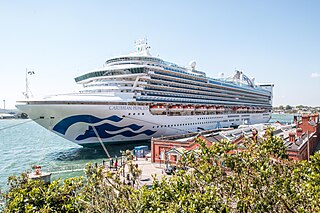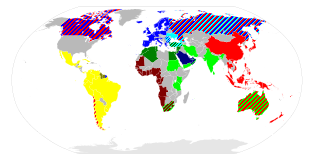Related Research Articles

The International Maritime Organization is a specialised agency of the United Nations responsible for regulating shipping. The IMO was established following agreement at a UN conference held in Geneva in 1948 and the IMO came into existence ten years later, meeting for the first time on 17 March 1958. Headquartered in London, United Kingdom, IMO currently has 175 Member States and three Associate Members.

The International Convention for the Prevention of Pollution from Ships, 1973 as modified by the Protocol of 1978, or "MARPOL 73/78" is one of the most important international marine environmental conventions. It was developed by the International Maritime Organization with an objective to minimize pollution of the oceans and seas, including dumping, oil and air pollution.

Flag of convenience (FOC) is a business practice whereby a ship's owners register a merchant ship in a ship register of a country other than that of the ship's owners, and the ship flies the civil ensign of that country, called the flag state. The term is often used pejoratively, and although common, the practice is sometimes regarded as contentious.
The International Convention for the Safety of Life at Sea (SOLAS) is an international maritime treaty which sets out minimum safety standards in the construction, equipment and operation of merchant ships. The International Maritime Organization convention requires signatory flag states to ensure that ships flagged by them comply with at least these standards.
A marine surveyor is a person who inspects, surveys, or examines marine vessels in order to assess damage, inspect or monitor their condition and that of any cargo on board. Marine surveyors also inspect equipment intended for new or existing vessels to ensure compliance with various standards or specifications. Marine surveys typically include the structure, machinery and equipment and general condition of a vessel and/or cargo. They also involve judging materials on board and their condition. Though a largely unregulated profession, marine surveyors are generally trained specifically for the role and usually selected after thorough evaluation procedures. Their duties apply to a wide range of seafaring vessels.

MS Caribbean Princess is a modified Grand-class cruise ship owned and operated by Princess Cruises, with a capacity of over 3,600 passengers, the largest carrying capacity in the Princess fleet until June 2013 when the new Royal Princess, another Princess ship superseded its record. She has 900 balcony staterooms and a deck of mini-suites.
The flag state of a merchant vessel is the jurisdiction under whose laws the vessel is registered or licensed, and is deemed the nationality of the vessel. A merchant vessel must be registered and can only be registered in one jurisdiction, but may change the jurisdiction in which it is registered. The flag state has the authority and responsibility to enforce regulations over vessels registered under its flag, including those relating to inspection, certification, and issuance of safety and pollution prevention documents. As a ship operates under the laws of its flag state, these laws are applicable if the ship is involved in an admiralty case.
The Maritime Transportation Security Act of 2002 (MTSA) is an Act of Congress enacted by the 107th United States Congress to address port and waterway security. It was signed into law by President George W. Bush on November 25, 2002.

In France, the general duty of coordinating maritime security and survey activities is assumed by seven Centres Régionaux Opérationnels de Surveillance et de Sauvetage. The polyvalence of these centers characterizes this French model. The CROSS assumes up to four functional missions in maritime territory international conventions. The CROSS practice their activities under the operational authority of the Maritime Prefects in mainland France and Government Representatives for State Action at Sea in Overseas Departments and Territories.

Port state control (PSC) is an inspection regime for countries to inspect foreign-registered ships in port other than those of the flag state and take action against ships that are not in compliance. Inspectors for PSC are called PSC officers (PSCOs), and are required to investigate compliance with the requirements of international conventions, such as SOLAS, MARPOL, STCW, and the MLC. Inspections can involve checking that the vessel is crewed and operated in compliance with applicable international law, and verifying the competency of the ship's master and officers, and the ship's condition and equipment.
Sector Commander is the position title of the commanding officer of a United States Coast Guard Sector, usually of the rank of Captain (O-6). The Sector Commander's second-in-command is the Deputy Sector Commander. Also reporting directly to the Sector Commander are the Command Master Chief (CMC), the Senior Reserve Officer, and the Sector's Auxiliary Coordinator.
Maritime Security Regimes are codes and conventions of behavior agreed upon by coastal states to provide a degree of security within territorial waters and on the high seas.
Indian Register of Shipping (IRClass) is an internationally recognised, independent ship classification society, founded in India in 1975. It is a public limited company incorporated under Section 25 of the Indian Companies Act 1956 (Section 8 of Indian Companies Act 2013). It is a Non-Profit organisation, Public undertaking and a member of the 12 member International Association of Classification Societies (IACS). It was inducted into IACS along with Croatian Register of Shipping (CRS) and Polish Register of Shipping (PRS).
The port of Hong Kong is a deep water port located in southern China. It is one of the hub ports serving the South-East and East Asia region, and is a gateway to mainland China. The city of Hong Kong began as a colony of the United Kingdom. It was a free port, and became an international trade center connecting land and sea transport between China and other countries. The port has mature infrastructure and well-developed air-sea-land transport. It helps Hong Kong maintain its position on international trade centre and transshipment hub.

The environmental effects of shipping include air pollution, water pollution, acoustic, and oil pollution. Ships are responsible for more than 18% of nitrogen oxides pollution, and 3% of greenhouse gas emissions.
Emission control areas (ECAs), or sulfur emission control areas (SECAs), are sea areas in which stricter controls were established to minimize airborne emissions from ships as defined by Annex VI of the 1997 MARPOL Protocol.
Vessel safety surveys are inspections of the structure and equipment of a vessel to assess the condition of the surveyed items and check that they comply with legal or classification society requirements for insurance and registration. They may occur at any time when there is reason to suspect that the condition has changed significantly since the previous survey, and the first survey is generally during construction or before first registration. The criteria for acceptance are defined by the licensing or registration authority for a variety of equipment vital to the safe operation of the vessel, such as safety equipment, lifting equipment, hull structure, static stability, ground tackle, propulsion machinery, auxiliary machinery, etc. The SOLAS Convention, specifies safety equipment for commercial vessels operating internationally.
Overseas Marine Certification Services also known as OMCS CLASS is an independent classification society, Recognized Organization (R.O.) and Recognized Security Organization (R.S.O.) based on Panama City, Republic of Panama.
The École du service public de la mer, is a Grande Ecole of the French Ministry of the Sea. It trains civil and military officers for the Directorate general for Maritime affairs, Fisheries and Aquaculture. This school is currently located in Le Havre, within the campus of the French Maritime Academy “École nationale supérieure maritime”, since September 2021 when it moved from the former site in Nantes.
The Ships Safety Centers or in French "Centres de Sécurité des Navires" are specialized services of the French Directorate general for Maritime affairs, Fisheries and Aquaculture. They are responsible for ships surveying and participate in the protection of human life at sea and the prevention of pollution from ships. They are located along the French coast and overseas. Within these centers, ship safety inspectors are responsible for both surveys of French flag vessels and of foreign vessels under Port State Control.
References
- ↑ "Port State Control". www.imo.org. Retrieved 2022-11-01.
- ↑ "About the CMOU | CaribbeanMOU". www.caribbeanmou.org. Retrieved 2022-11-01.